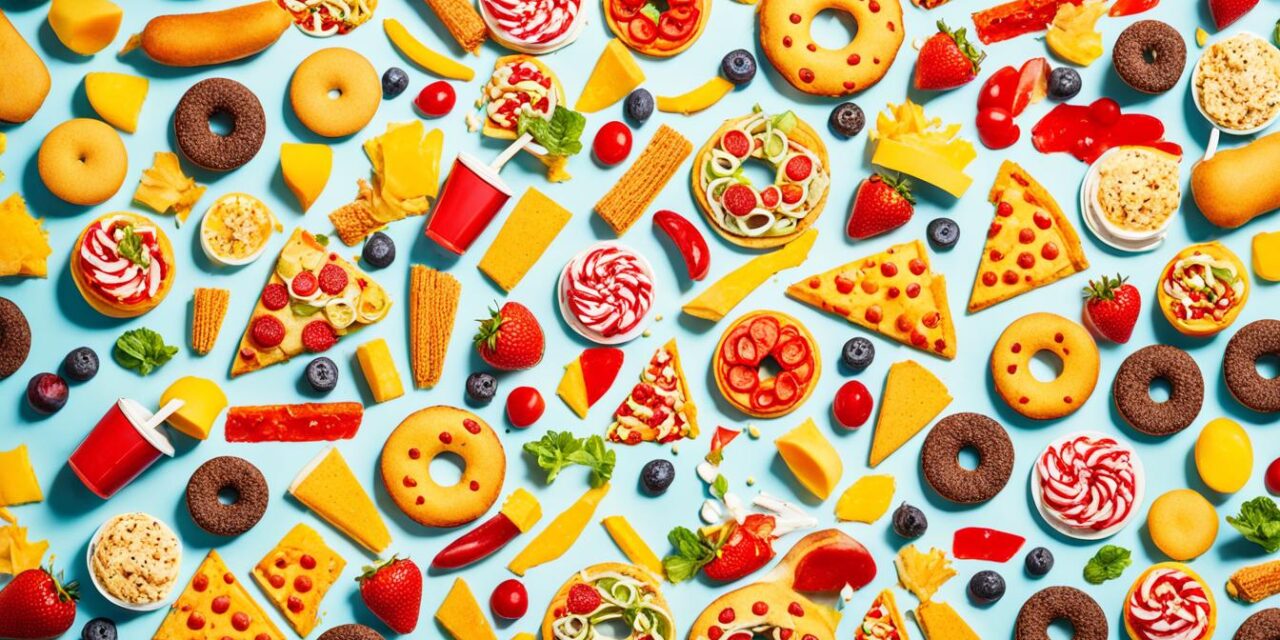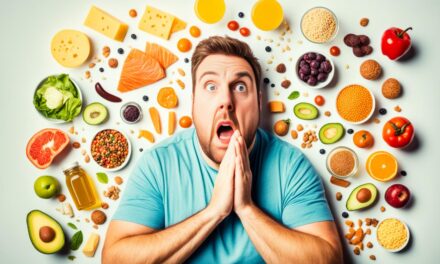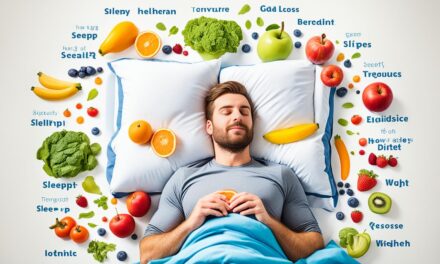Did you know that a significant percentage of individuals meet the criteria for food addiction? According to the American Journal of Psychiatry, while food addiction isn’t officially recognized as a clinical disorder, there is growing evidence to support the existence of addictive eating behaviors.
When it comes to food addiction, processed food cravings can be incredibly difficult to overcome. Highly processed foods, such as candy, ice cream, chips, and pizza, have been found to trigger addictive behaviors in certain individuals. But fear not! Breaking the cycle is possible with the right knowledge and strategies.
Key Takeaways:
- Food addiction is a real issue, although it is not officially recognized as a clinical disorder.
- Highly processed foods can trigger addictive behaviors in certain individuals.
- Overcoming food addiction requires breaking the cycle of processed food cravings.
- Adopting healthy eating habits and seeking support are essential in the journey to recovery.
- Professional help, such as counseling and therapy, can provide guidance and support throughout the process.
What is Food Addiction?
Food addiction is a sneaky villain that can take hold of anyone, leading to addictive eating behaviors that seem impossible to break free from. Similar to other forms of addiction, it involves a lack of restraint and continues despite the negative physical, emotional, and social consequences it brings.
Think about it: you finish a bag of potato chips and immediately reach for another, even though you’re already full. Or you find yourself craving sugary treats like candy or ice cream, unable to resist the temptation even when you know they’re not good for you. These addictive eating behaviors can leave you feeling powerless, trapped in a cycle of cravings and guilt.
But why is it that certain foods seem to have such a hold on us? Well, it turns out that highly processed foods have a special power over our brains. They trigger addictive behaviors in certain individuals, leading to a physiological response that mirrors what happens in other types of addiction.
When we consume highly processed foods such as candy, ice cream, chips, and pizza, our brains go into overdrive. These foods stimulate our reward system, releasing a surge of dopamine—our brain’s feel-good neurotransmitter.
“They say you shouldn’t fall in love with food, but some highly processed treats are just irresistible. They have a way of hijacking your brain’s reward system and keeping you hooked, craving more and more.”
Just like with other addictive substances, this dopamine rush creates a strong desire to seek out and consume more of these foods. It’s a vicious cycle that can be difficult to break free from.
So, yes, food addiction is real. It might not have an official clinical diagnosis yet, but the evidence is mounting. The grip of addictive eating behaviors and the physiological processes involved are not to be taken lightly.
Now that you understand what food addiction is, let’s dive deeper into the science behind food-related addictive behavior.
The Science of Food-Related Addictive Behavior
Did you ever wonder why it’s so hard to resist that delicious slice of pizza or that mouthwatering bag of chips? The answer lies in the science of food-related addictive behavior.
Highly rewarding foods, particularly those high in sugar, fat, and salt, have the power to hijack our brain’s reward system. When we consume these foods, they activate the release of dopamine neurotransmitters, creating a pleasurable sensation. This dopamine rush is like a natural high, and it creates a desire to consume more of these foods, leading to an unhealthy cycle of cravings.
But why are highly processed foods so effective at triggering this addictive response? The answer lies in their precise chemical composition. Food manufacturers engineer these foods to be as delicious as possible by combining just the right amounts of fats, sugars, and salt. This perfect combination is like a magic formula that activates the brain’s reward circuitry.
Brain scans have shown that the combination of fat and carbohydrates in food activates the brain’s reward circuitry more than foods containing only fat or carbohydrates. This powerful activation creates a heightened desire to consume highly processed foods, making it harder to resist their allure.
“The combination of fats and carbohydrates in food has an addictive effect on our brain, leading to a heightened desire to consume highly processed foods.”
Understanding the science behind food-related addictive behavior can help us become more aware of the factors influencing our cravings. By recognizing the power of these highly rewarding foods and their impact on our brain, we can make more informed choices about our eating habits and develop strategies to break free from the cycle of food addiction.
Should Food Addiction Be a Clinical Disorder?
The contentious issue of whether food addiction should be classified as a clinical disorder remains a subject of debate among health professionals. While some argue for its validity, supported by research and evidence, others contend that further investigation is necessary to establish clear diagnostic criteria for this condition. The overlapping symptoms of food addiction, obesity, and eating disorders present challenges in distinguishing and diagnosing food addiction definitively. Currently, food addiction is not officially recognized as a clinical disorder but is acknowledged as a potential issue that clinicians address with their clients.
Can You Be Addicted to the Act of Eating?
While some researchers argue that addictive symptoms are related to the act of eating itself, rather than specific foods, it is important to note that the majority of addictive-like behaviors are associated with highly processed and sugary foods, rather than natural and minimally processed foods.
It is no secret that certain foods have a unique power to captivate our taste buds and create a seemingly insatiable desire for more. The history of food addiction aligns with the rise of cheap, ultra-processed foods in the modern food environment, suggesting that specific foods play a significant role in addictive patterns of eating.
In fact, research has shown that highly processed foods are carefully engineered to maximize their addictive potential. These foods are often packed with excessive amounts of sugar, unhealthy fats, and artificial additives, all of which contribute to their addictive nature. They are designed to trigger the brain’s reward system and create intense cravings, leading to a cycle of compulsive consumption.
Eating addictive foods can lead to a range of symptoms commonly associated with addiction, such as loss of control, cravings, and withdrawal-like symptoms. Individuals who experience these symptoms may find themselves trapped in a vicious cycle of overeating and feeling powerless to break free.
“I can resist everything except temptation.” – Oscar Wilde
Understanding the Addictive Nature of Processed Foods
The addictive nature of processed foods can be attributed to a combination of factors. Firstly, these foods are often high in sugar, which stimulates the release of dopamine in the brain. Dopamine is a neurotransmitter associated with pleasure and reward, and its release creates a sense of euphoria and reinforces the desire for more.
Secondly, highly processed foods are typically low in essential nutrients and high in empty calories. This means that despite consuming large amounts of these foods, the body’s nutritional needs remain unmet. The result is a perpetual state of hunger and cravings, as the body seeks the necessary nutrients it lacks.
| Addictive Foods | Unprocessed Alternatives |
|---|---|
| Sugary cereals | Steel-cut oats with fresh fruit |
| Potato chips | Roasted chickpeas |
| Candy bars | Dark chocolate with nuts |
| Soda | Fruit-infused water |
Breaking the cycle of eating addiction involves recognizing the addictive nature of processed foods and consciously choosing healthier alternatives. By substituting highly processed and addictive foods with nourishing, unprocessed options, individuals can gradually retrain their taste buds, reduce cravings, and regain control over their eating habits.
Remember, overcoming eating addiction is a journey, and it requires patience, self-awareness, and a commitment to making positive changes in your lifestyle. By seeking support from healthcare professionals, practicing mindful eating, and adopting healthy eating habits, you can break free from the grips of eating addiction and create a healthier relationship with food.
Overlap With Binge Eating Disorder
If you have been diagnosed with binge eating disorder (BED), you may find it interesting to know that there is an overlap between BED and food addiction. In fact, individuals with BED are more likely to meet the criteria for food addiction. Both conditions share common symptoms and characteristics, such as a loss of control over eating, feelings of guilt and shame, and intense cravings.
While there are some differences between binge eating disorder and food addiction, such as the volume of food consumed during a binge episode versus the specific food or drive to eat in food addiction, there are significant similarities in terms of reward dysfunction and impulsivity.
Research suggests that both binge eating disorder and food addiction involve a disruption in the brain’s reward system and its response to certain foods. The reward system is responsible for releasing dopamine, a neurotransmitter associated with pleasure and motivation. In individuals with BED and food addiction, this reward system becomes dysregulated, leading to a compulsive cycle of overeating.
“Binge eating disorder and food addiction share common symptoms and characteristics.”
Understanding the Overlapping Mechanisms
The overlap between binge eating disorder and food addiction can be attributed to several shared underlying mechanisms. Both conditions involve psychological factors, such as emotional distress, trauma, and low self-esteem, which contribute to disordered eating patterns and the development of addictive behaviors.
In addition, both binge eating disorder and food addiction are associated with abnormalities in the brain’s reward pathways. Research has shown that highly palatable and processed foods, which are often triggers for individuals with BED, can activate the brain’s reward centers in a similar manner to drugs of abuse.
The impulsivity seen in both binge eating disorder and food addiction further highlights the overlap between the two conditions. Individuals with BED and food addiction often struggle with self-control and have difficulty resisting urges to eat, even when they are not physically hungry.
Comparing Binge Eating Disorder and Food Addiction
| Binge Eating Disorder | Food Addiction |
|---|---|
| Involves recurrent episodes of binge eating | Characterized by an addictive-like relationship with food |
| Feelings of guilt and shame after binge episodes | Intense cravings and difficulty controlling food intake |
| Often associated with emotional distress and low self-esteem | Can co-occur with other addictive behaviors |
| May lead to weight gain and obesity | Can contribute to weight gain and health problems |
The table above highlights some of the key differences and similarities between binge eating disorder and food addiction. While they may be separate conditions, understanding the overlap can provide valuable insights for effective treatment and management strategies.
“Understanding the overlap between binge eating disorder and food addiction can inform treatment strategies.”
“The similarities between binge eating disorder and food addiction point to the need for addressing underlying psychological factors and developing healthier coping mechanisms.”
By addressing the underlying emotional, psychological, and physiological factors contributing to both binge eating disorder and food addiction, individuals can work towards developing healthier relationships with food and breaking free from the cycle of compulsive eating.
Now that we’ve explored the overlap between binge eating disorder and food addiction, let’s move on to Section 7, where we will discuss strategies for breaking the cycle of food addiction and fostering a healthier relationship with food.
Strategies for Breaking the Cycle of Food Addiction
Overcoming food addiction requires a combination of willpower, self-awareness, and support. It’s time to take control of your relationship with food and make positive changes in your lifestyle. Here are some effective strategies to help you break the cycle of food addiction:
Lifestyle Changes
Start by identifying the factors in your lifestyle that contribute to your food addiction. Set personal goals and create a plan to avoid triggers and unhealthy environments. This may include avoiding fast-food places, processed snacks, and high-sugar beverages. By making conscious choices and steering clear of tempting situations, you can develop healthier eating habits and regain control over your food choices.
Mindful Eating
Mindful eating is a powerful technique that encourages you to pay attention to the sensory experiences associated with eating. Slow down, savor each bite, and truly enjoy your meals. By being fully present during mealtime, you can cultivate a better awareness of your body’s hunger and fullness cues. Mindful eating allows you to make healthier food choices and prevents overeating.
Transition to a Healthier Diet
A gradual transition to a healthier diet is essential for breaking the cycle of food addiction. Incorporate fresh fruits, vegetables, lean meats, whole grains, and legumes into your meals. These nutrient-rich foods provide the necessary vitamins, minerals, and fiber your body needs to thrive. Experiment with new recipes and flavors to make healthy eating enjoyable and sustainable.
Regular Exercise
Physical activity not only helps improve your overall health but also supports your journey in overcoming food addiction. Engaging in regular exercise releases endorphins, reduces stress, and boosts your mood. Aim for a combination of aerobic exercises, strength training, and activities you genuinely enjoy. Remember, finding joy in movement can shift your focus from food and enhance your overall well-being.
Build a Support System
Breaking the cycle of food addiction can be challenging on your own. Surround yourself with a supportive network of family and friends who understand your goals and challenges. Share your journey with them, seek their encouragement, and ask for accountability. Additionally, consider joining support groups or seeking professional help from therapists or counselors specializing in food addiction. Having a solid support system is vital in maintaining motivation and staying on track.
Remember, overcoming food addiction is a process that requires patience and commitment. By implementing these strategies and making conscious choices, you can break free from the cycle of food addiction and establish healthier eating habits. Take the first step today towards a happier, healthier future!
Conclusion
So you’ve recognized that you’re struggling with food addiction, but don’t worry, you’re not alone. Food addiction is a complex issue that requires individualized approaches to recovery.
Seeking professional help from mental health professionals, such as counselors or therapists, can provide the guidance and support you need throughout the recovery process. They can help you navigate the challenges of food addiction and develop effective strategies for overcoming it.
Treatment options for food addiction may involve nutritional counseling to learn how to make healthier food choices, identifying triggers that lead to unhealthy eating patterns, medication to address underlying physiological processes, and joining support groups to connect with others who are going through similar experiences.
Remember, overcoming food addiction is a journey that requires patience, self-compassion, and consistent effort. With the right support and tools, you can break the cycle of processed food cravings and develop healthier eating habits. Take that first step towards a healthier and happier life today!
FAQ
What is food addiction?
How does food addiction affect the brain?
Is food addiction recognized as a clinical disorder?
Can you be addicted to the act of eating?
How does food addiction overlap with binge eating disorder?
What strategies can help break the cycle of food addiction?
Is seeking professional help necessary for food addiction recovery?
MORE SOURCES TO READ:
- https://www.everydayhealth.com/emotional-health/is-food-addiction-real/
- https://www.healthline.com/nutrition/are-processed-foods-addictive
- https://kentuckycounselingcenter.com/the-best-solutions-on-how-to-overcome-food-addiction/
![]()














Recent Comments